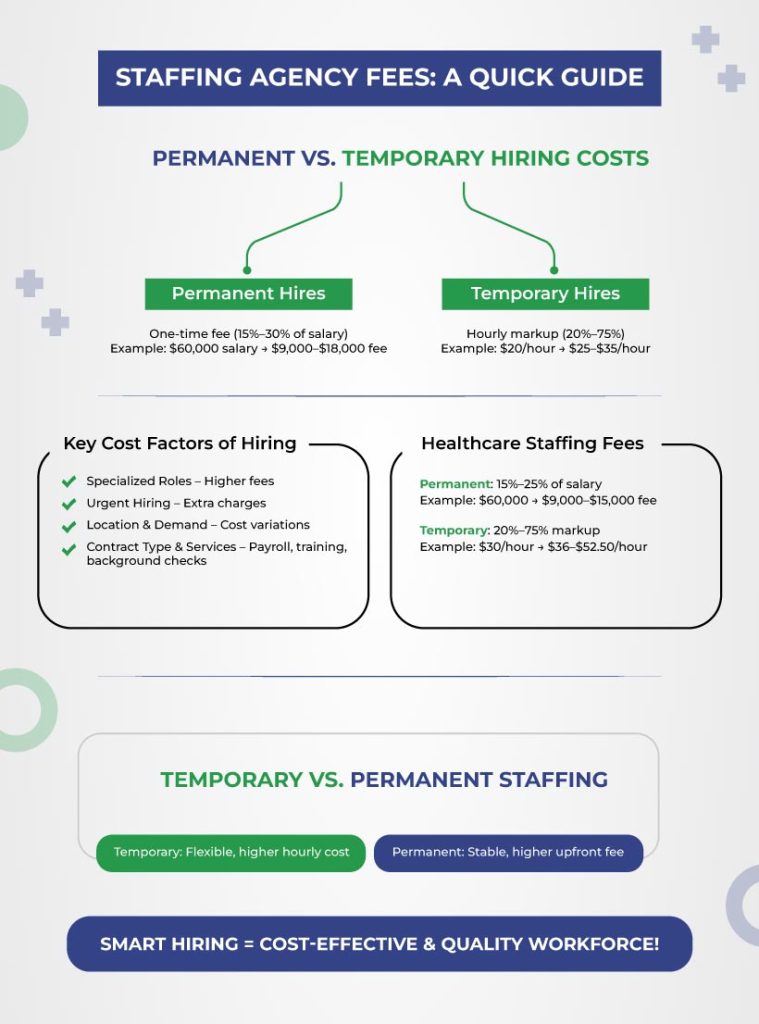Hiring the right worker can be difficult for companies.
That is why many businesses use staffing agencies to find employees. These agencies help match workers with jobs, but they charge a fee for their services. The cost depends on whether the job is permanent or temporary.
For permanent jobs, agencies take a one-time fee.

This fee is a percentage of the worker’s yearly salary. It usually ranges from 15% to 30%. For example, if a worker earns $60,000 a year, the agency may charge between $9,000 and $18,000.
On the other hand, for temporary jobs, agencies charge an extra amount on top of the worker’s hourly pay.
This extra amount is called a markup. The markup is usually between 20% and 75%. For instance, if a worker earns $20 per hour, the company may have to pay the agency between $25 and $35 per hour.
Several factors affect how much an agency charges.
First, jobs that need special skills usually cost more. Second, if many people need a job, agencies may raise their prices. Also, the way prices are set matters. For example, Wholesale Pricing or Agency Pricing on Online Retail Platforms: The Effects of Customer Loyalty can change how businesses decide their fees.
In addition, agencies that offer extra services, like training and payroll help, may charge higher prices.
Because fees can change depending on the industry and location, companies should always ask about the costs before hiring.
Average Fees for Healthcare Staffing Agencies
Healthcare staffing agencies help medical facilities find the right workers.
They charge fees based on the type of job. The cost depends on whether the job is permanent or temporary. For permanent jobs, agencies charge a one-time fee. This fee is a percentage of the worker’s yearly salary.
It usually ranges from 15% to 25%.

For example, if a worker earns $60,000 a year, the agency fee could be between $9,000 and $15,000. On the other hand, for temporary jobs, agencies charge a markup. This means they add an extra cost to the worker’s hourly pay.
The markup is usually between 20% and 75%.
For instance, if a nurse earns $30 per hour, the agency may charge the facility between $36 and $52.50 per hour. Several factors affect these fees. First, some jobs need special skills, so the fees are higher.
Second, if a job is in high demand, agencies may also charge more.
In addition, healthcare costs can vary based on location and the overall cost of living. Moreover, differences in patient residency status can also influence pricing. Research, such as Inequality in healthcare costs between residing and non-residing patients: evidence from Vietnam, highlights how these factors create disparities in medical expenses.
Therefore, it is crucial for healthcare facilities to analyze these cost variations. This understanding helps them manage budgets effectively and make informed hiring decisions.
Factors Affecting Staffing Agency Fees
Staffing agencies help businesses find workers. However, their fees depend on several factors. Companies should understand these factors before hiring through an agency.
1. Level of Specialization Required
Some jobs need special skills or experience. Finding the right workers for these jobs takes more effort. Therefore, agencies charge higher fees for specialized roles.
2. Urgency of Hiring
If a company needs a worker quickly, the agency may charge extra. Emergency placements require faster work, which increases the cost.
3. Geographic Location and Local Labor Market
The location of the job affects the agency’s fee. In areas where living costs are high, wages are also higher. As a result, agencies may charge more. Additionally, if there are fewer workers available, the fees may also go up.
4. Contract Type
The type of job also impacts the cost. Temporary jobs, temp-to-perm positions, and direct hires have different fee structures. Some contracts require more work from the agency, so they charge more.
5. Additional Administrative Costs and Onboarding Services
Many agencies offer extra services like background checks, training, and payroll management. These services help businesses, but they also increase the overall cost.
Therefore, companies should consider these factors before working with a staffing agency. This helps them plan their hiring budget and make better decisions.
Suggested Read: How Temporary Assignments Cater to Different Career Phases?
Comparing Temporary and Permanent Staffing Costs
Hospitals and clinics must decide whether to hire temporary or permanent healthcare workers. Each choice has different costs. Understanding these costs helps healthcare facilities manage their budgets wisely.
Costs of Temporary Healthcare Workers
Temporary workers are paid by the hour.
Staffing agencies add extra charges, called a markup, to cover their expenses. This markup can range from 20% to 75% of the worker’s hourly pay. For example, if a nurse earns $30 per hour, the agency may charge the hospital between $36 and $52.50 per hour.
Another important factor is benefits.
Most temporary workers do not receive health insurance, retirement plans, or paid time off. As a result, hospitals can save money. However, training these workers may still add to costs.
Costs of Permanent Healthcare Workers
Hiring permanent staff often involves a one-time placement fee.
This fee is usually 10% to 20% of the employee’s yearly salary. For example, if a worker earns $60,000 per year, the agency fee could be between $6,000 and $12,000. Permanent employees also receive benefits such as health insurance and retirement plans.
These benefits increase the total payroll costs.
However, permanent staff stay longer and help provide better patient care. Even though they cost more, they help reduce the need for frequent hiring.
Balancing Staffing Costs with Budgets
Hospitals and clinics must balance staffing costs with their budgets.
Temporary workers offer flexibility. When patient numbers go up, hospitals can hire more staff. When patient numbers go down, they can reduce staff. However, relying too much on temporary workers can be expensive in the long run.
On the other hand, permanent staff provide stability.
They build strong healthcare teams and improve patient care. Even though they have higher salaries and benefits, they stay with the hospital longer. In the end, hospitals and clinics need to find the right balance.
By considering costs, patient needs, and budget limits, they can make the best hiring decisions.
Suggested read: What is the Locum Tenens Staffing Model?
Smart Staffing: Balancing Cost & Quality in Healthcare Hiring
Balancing cost and quality in healthcare staffing is important.
Hospitals and clinics must make smart choices to provide good patient care while managing expenses. To do this, they need to plan their staffing budget carefully and compare different agencies.
First, healthcare facilities should understand their patient volume.
If they know how many patients they serve, they can hire the right number of workers. Next, they should plan for changes. Patient numbers can go up or down due to seasonal trends or unexpected events.
By preparing in advance, hospitals can avoid being understaffed or overstaffed.
In addition, facilities should set aside funds for training. Well-trained staff work more efficiently and provide better care. Investing in education helps improve the quality of healthcare services. When choosing a staffing agency, hospitals should compare costs.
It is important to ask for price details from different agencies.
This way, they can find the best option that fits their budget. However, cost is not the only factor. Hospitals should also check the quality of workers provided by an agency. Reading reviews and asking for references can help them find skilled and reliable staff.
Lastly, flexibility matters. Some hospitals need workers on short notice.
Others require long-term staff. Choosing an agency that meets these needs helps in maintaining smooth operations. In conclusion, healthcare facilities must plan their budgets and compare agencies carefully.
By partnering with a healthcare staffing agency and making strategic hiring decisions, healthcare facilities can effectively manage costs while maintaining high-quality patient care.

